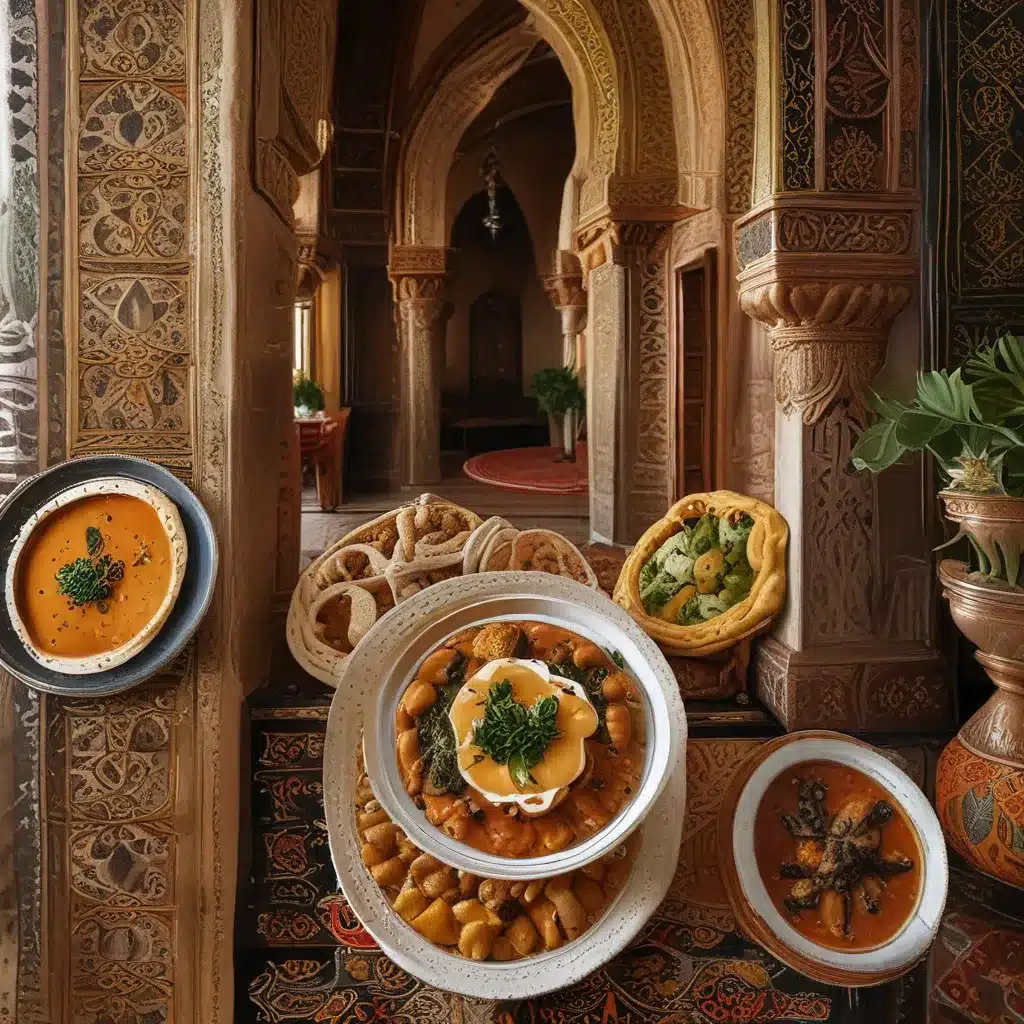
The Wondrous World of Couscous
As I strolled through the bustling streets of Marrakech, the tantalizing aromas of spices and sizzling meats wafted through the air, luring me deeper into the heart of Moroccan cuisine. But amidst the vibrant sights and sounds, one humble grain stood out as a true culinary gem: couscous.
Couscous, the quintessential staple of Moroccan fare, is a delightfully light and fluffy delight that serves as the perfect base for an array of rich sauces and stews. As the blogger Katie Morris of Katie at the Kitchen Door rightly points out, couscous is an underappreciated food that truly deserves more recognition. With its quick and easy preparation, it’s no wonder this versatile grain was a go-to dorm meal during my college days.
But couscous is far from just a simple staple – it’s a canvas upon which the vibrant flavors of Moroccan cuisine can be painted. As I planned my own rendition of “Royal Couscous,” I found myself constantly adding more ingredients, each one adding a new layer of complexity and depth. Preserved lemon, pomegranate, orange juice, parsley – the possibilities were endless, and the result was a dish that truly lived up to its regal name.
The Tapestry of Moroccan Flavors
The richness of Moroccan cuisine, however, extends far beyond the realm of couscous. As the writer at La Muse Blue eloquently describes, the gourmet pursuits in Morocco stretch well beyond the familiar tajines and mint tea. The culinary tapestry of this North African nation is a kaleidoscope of influences, from the native Berber tribes to the waves of invaders and traders that have left their mark over the centuries.
Take, for instance, the breakfast staple of amlou, a healthier version of Nutella that is spread over the round, brown flatbread known as khobz or the pan-fried semolina harcha. The amlou, a blend of almond paste, argan oil, and honey, is a testament to the region’s rich agricultural heritage and the ingenuity of its people. And the variety of Moroccan breads, from the bubbly beghrir pancakes to the flaky, snail-shaped meloui, is a masterclass in the art of baking.
But the true heart of Moroccan cuisine lies in the communal tradition of sharing. Whether it’s the street-side tajine stands or the elaborate feasts at home, Moroccans have a deep-rooted appreciation for the power of food to bring people together. From the vegetable-based salads that start the meal to the saffron-infused teas that conclude it, every dish is a reflection of the country’s diverse culinary identity.
The Regal Splendor of Royal Moroccan Cuisine
As I delved deeper into the world of Moroccan cuisine, I couldn’t help but be captivated by the regal splendor of its highest echelons. Through the lens of the Instagram post, I learned about the role of preserved olives, olive tapenade, and the prized argan oil in Moroccan culinary traditions. These ingredients, revered for their complex flavors and health benefits, are woven into the fabric of the nation’s gourmet heritage.
But it’s not just the ingredients that lend a touch of royalty to Moroccan cuisine – the preparation methods and presentation also play a crucial role. The slow-roasted tanjia, a Marrakech classic, and the saffron-infused Moroccan tea are testament to the patience and attention to detail that defines the pinnacle of this culinary art form.
And let’s not forget the role of special occasions in elevating Moroccan cuisine to new heights. From the preserved lemon-scented cockerel or chicken to the lamb tajines with prunes, every element of a Moroccan feast is carefully curated to create a truly regal experience. The use of fragrant herbs like mint, sage, and verbena, combined with the judicious application of spices, transforms even the most humble ingredients into something truly fit for a king.
Discovering the Riches of El Bahia
As I reflect on my journey through the wondrous world of Moroccan cuisine, I can’t help but feel a sense of excitement and anticipation. The riches of this culinary tradition are truly unparalleled, from the humble yet versatile couscous to the regal splendor of the royal feasts.
And now, with the opening of El Bahia, a Moroccan restaurant in the heart of New York City, the opportunity to explore and indulge in these culinary delights has never been greater. Whether you’re a seasoned foodie or a curious newcomer, the team at El Bahia is dedicated to transporting you on a sensory journey through the riches of Moroccan cuisine.
So, step into the doors of El Bahia and let your taste buds be swept away by the vibrant flavors, the captivating aromas, and the regal splendor of this extraordinary culinary tradition. Embark on a culinary adventure that will leave you with a newfound appreciation for the wonders of Moroccan cuisine.


